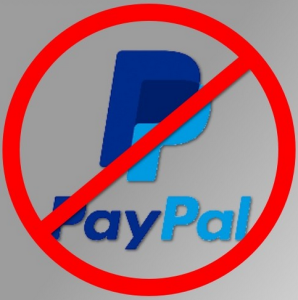Make an example of PayPal
 We sent essentially the following message (embellished some for our readership) to the online banking and financial services company PayPal. We have had an account with them for about 12 years. It is in response to theirs and that of the LGBT world’s bullying tactics deployed against the people of North Carolina for their decision balancing and protecting privacy rights of the general population. Those rights are under assault from irresponsible culture wreckers and so-called transgendered people claiming a right to use bathrooms opposite to their genetic makeup.
We sent essentially the following message (embellished some for our readership) to the online banking and financial services company PayPal. We have had an account with them for about 12 years. It is in response to theirs and that of the LGBT world’s bullying tactics deployed against the people of North Carolina for their decision balancing and protecting privacy rights of the general population. Those rights are under assault from irresponsible culture wreckers and so-called transgendered people claiming a right to use bathrooms opposite to their genetic makeup.
Dear PayPal:
North Carolina has a right to protect women and girls from predation. You have a right not to do business there and I have a right to cancel my business with you. I have on this day withdrawn all but two cents from my PayPal account. The two-cents is to remind you that your customers have something to say when you inject yourself into considered decisions of the elected representatives of the people of North Carolina. Your decision to boycott North Carolina is unscrupulous, harmful to culture in this country while you continue to do business in the most despicable of countries regarding human rights. Your hypocrisy is overwhelming. I will look to open an account with ProPay instead and I will encourage people through avenues available to me that they avoid PayPal.
Our intent is to not have any money sitting in a PayPal account and we hope it costs them money to retain our empty account (the two-cents is explained). The main point is to have no money of ours used for their banking operation and we will select alternative avenues for payment processing of online transactions.
Steve Berman at The Resurgent had this to say
PayPal has demonstrated with their business vote that they don’t particularly value people of faith as their customers.
Their corporate blackmail in North Carolina over HB2 is beyond the pale, and prompted me to cancel my account with them. I’ve been a PayPal user for at least a decade (probably longer), but no more. I’m not one of those “boycott’em” Christians who eschews Disney or every company with worldly values. . . .
Based on 2nd Vote’s recommendation, I will be moving my payment activity to ProPay.
Heritage Foundation’s Daily Signal has more to say about the matter:
Liberals’ Double Standard on Bathrooms, Boycotts, and Religious Freedom
Here are some excerpts from the article by Ryan T. Anderson:
If it wasn’t for double standards, some liberals would have none at all. That seems to be the lesson from the past few weeks, where liberals have displayed three distinct forms of hypocrisy.
(snip)
At issue are a Mississippi law that narrowly and carefully protects the rights of religious charities, small businesses, and select public servants and a North Carolina law that reasonably protects privacy and safety in public restrooms, while leaving private institutions free to set their own bathroom policies. These laws, apparently, are now unacceptable to some voices on the left.
But are they really? The hypocrisy in their opposition suggests otherwise.
1. Big Money and Big Business in Politics Are Bad, Unless They Support the Left?
(snip)
These corporate elites didn’t win an argument about good public policy. Instead, they threatened to boycott and transfer jobs out of states if the politicians didn’t do as they insisted.
This economic coercion is a form of cronyism—cultural cronyism. Big businesses use their outsized market share to pressure government to do their bidding at the expense of the will of the people and the common good. And, hypocritically, the left cheers it on.
2. Bruce Springsteen and Bryan Adams Get to Follow Their Consciences, but the Baker and Florist Don’t?
(snip)
(Such laws) don’t deny anyone civil rights. Instead, they protect civil rights. They protect religious freedom, which, as the liberal American Civil Liberties Union (ACLU) once acknowledged, is a civil liberty.
So Springsteen and Adams are exercising their freedom of conscience by boycotting states that sought to protect the consciences of adoption agencies, religious schools, bakers, and florists. Do they not see the hypocrisy?
3. North Carolina and Mississippi Are Human Rights Violators, but Singapore and Cuba Are Great?
Finally, if these boycotts are really a matter of principle—and not just grandstanding—then why do so many of these same companies do business in foreign countries with terrible records on human rights in general, and for LGBT people in particular?
(snip)
Others have pointed out the hypocrisy of PayPal. The CEO of PayPal announced that the company wouldn’t expand in North Carolina because of “PayPal’s deepest values and our strong belief that every person has the right to be treated equally, and with dignity and respect.”
Really?
Then PayPal might want to explain why its international headquarters are in Singapore, where people engaged in private consensual same-sex acts can face two years in jail. It might also want to explain why it announced in 2012 that it would open offices in the United Arab Emirates (UAE). While North Carolina placed some commonsense limits on public bathrooms, the UAE reportedly jails gay and transgender people.
More about alternatives to PayPal here
R Mall
